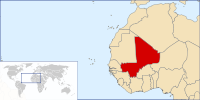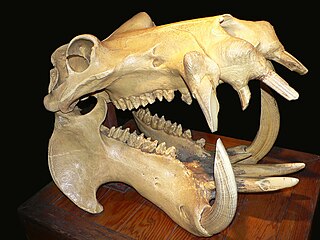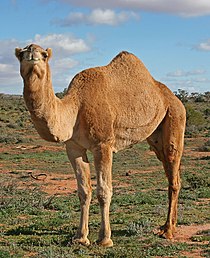Portal:Africa



Africa is the world's second-largest and second-most populous continent after Asia. At about 30.3 million km2 (11.7 million square miles) including adjacent islands, it covers 20% of Earth's land area and 6% of its total surface area. With 1.4 billion people0 as of 2021, it accounts for about 18% of the world's human population. Africa's population is the youngest among all the continents; the median age in 2012 was 19.7, when the worldwide median age was 30.4. Despite a wide range of natural resources, Africa is the least wealthy continent per capita and second-least wealthy by total wealth, ahead of Oceania. Scholars have attributed this to different factors including geography, climate, corruption, colonialism, the Cold War, and neocolonialism. Despite this low concentration of wealth, recent economic expansion and the large and young population make Africa an important economic market in the broader global context. Africa has a large quantity of natural resources and food resources, including diamonds, sugar, salt, gold, iron, cobalt, uranium, copper, bauxite, silver, petroleum, natural gas, cocoa beans, and.
Africa straddles the equator and the prime meridian. It is the only continent to stretch from the northern temperate to the southern temperate zones. The majority of the continent and its countries are in the Northern Hemisphere, with a substantial portion and a number of countries in the Southern Hemisphere. Most of the continent lies in the tropics, except for a large part of Western Sahara, Algeria, Libya and Egypt, the northern tip of Mauritania, and the entire territories of Morocco, Ceuta, Melilla, and Tunisia which in turn are located above the tropic of Cancer, in the northern temperate zone. In the other extreme of the continent, southern Namibia, southern Botswana, great parts of South Africa, the entire territories of Lesotho and Eswatini and the southern tips of Mozambique and Madagascar are located below the tropic of Capricorn, in the southern temperate zone.
Africa is highly biodiverse; it is the continent with the largest number of megafauna species, as it was least affected by the extinction of the Pleistocene megafauna. However, Africa also is heavily affected by a wide range of environmental issues, including desertification, deforestation, water scarcity, and pollution. These entrenched environmental concerns are expected to worsen as climate change impacts Africa. The UN Intergovernmental Panel on Climate Change has identified Africa as the continent most vulnerable to climate change.
The history of Africa is long, complex, and varied, and has often been under-appreciated by the global historical community. Africa, particularly Eastern Africa, is widely accepted to be the place of origin of humans and the Hominidae clade, also known as the great apes. The earliest hominids and their ancestors have been dated to around 7 million years ago, including Sahelanthropus, Australopithecus africanus, A. afarensis, Homo erectus, H. habilis and H. ergaster, the earliest Homo sapiens (modern human) remains, found in Ethiopia, South Africa, and Morocco, date to circa 233,000, 259,000, and 300,000 years ago, respectively, and Homo sapiens is believed to have originated in Africa around 350,000–260,000 years ago. Africa is also considered by anthropologists to be the most genetically diverse continent as a result of being the longest inhabited. (Full article...)
Selected article –
On 25 October 2021, the Sudanese military, led by General Abdel Fattah al-Burhan, took control of the Government of Sudan in a military coup. At least five senior government figures were initially detained. Civilian Prime Minister Abdalla Hamdok refused to declare support for the coup and on 25 October called for popular resistance; he was confined to house arrest on 26 October. Internet outages were reported. Later the same day, the Sovereignty Council was dissolved, a state of emergency was put in place, and a majority of the Hamdok Cabinet and a number of pro-government supporters were arrested. , the list of those detained included "government ministers, members of political parties, lawyers, civil society activists, journalists, human rights defenders, and protest leaders", who were held in secret locations, without access to their families or lawyers.
Key civilian groups including the Sudanese Professionals Association and Forces of Freedom and Change called for civil disobedience and refusal to cooperate with the coup organisers. Protests started on 25 and 26 October against the coup and at least 10 civilians were reported as being killed and over 140 injured by the military during the first day of protests. Protests and strikes continued, with 200,000 to 2,000,000 protestors participating around Sudan on 30 October and 15 shot dead by security forces in protests organised by the Sudanese resistance committees on 17 November. (Full article...)Featured pictures –
Did you know (auto-generated) -

- ... that the son of an engine fitter from England became Director of Education in part of modern-day South Africa for almost twenty years?
- ... that a 1939 thesis by Nathaniel Fadipe, The Sociology of the Yoruba, was the first sociological study by a black African?
- ... that after the 1999 Tempe military base shooting, the Pan African Congress demanded a military funeral for the perpetrator?
- ... that Gil Scott-Heron's 1975 song "Johannesburg" was banned in South Africa during apartheid?
- ... that Mimi Fawaz's work includes a documentary on the life of South African president Nelson Mandela?
- ... that after erecting the African Union headquarters, the Chinese government was accused in 2018 of spying on the building for five years?
Categories
Selected biography –
Paul Kagame (/kəˈɡɑːmeɪ/ kə-GAH-may; born 23 October 1957) is a Rwandan politician and former military officer who has been the President of Rwanda since 2000. He was previously a commander of the Rwandan Patriotic Front (RPF), a rebel armed force which invaded Rwanda in 1990. The RPF was one of the parties of the conflict during the Rwandan Civil War and the armed force which ended the Rwandan genocide. He was considered Rwanda's de facto leader when he was Vice President and Minister of Defence under President Pasteur Bizimungu from 1994 to 2000 after which the vice-presidential post was abolished.
Born to a Tutsi family in southern Rwanda that fled to Uganda when he was two years old, Kagame spent the rest of his childhood there during the Rwandan Revolution, which ended Tutsi political dominance. In the 1980s, Kagame fought in Yoweri Museveni's rebel army becoming a senior Ugandan army officer after many military victories led Museveni to the Ugandan presidency. Kagame joined the RPF, taking control of the group when previous leader Fred Rwigyema died on the second day of the 1990 invasion. By 1993, the RPF controlled significant territory in Rwanda and a ceasefire was negotiated. The assassination of Rwandan President Juvénal Habyarimana set off the genocide, in which Hutu extremists killed an estimated 500,000 to 800,000 Tutsi and moderate Hutu. Kagame resumed the civil war and ended the genocide with a military victory. (Full article...)Selected country –
 |
 |
||

| |||
Mali, officially the Republic of Mali (French: République du Mali), is a landlocked nation in Western Africa. It is the seventh largest country in Africa. It borders Algeria on the north, Niger on the east, Burkina Faso and the Côte d'Ivoire on the south, Guinea on the south-west, and Senegal and Mauritania on the west. Formerly French Sudan, the country is named after the Mali Empire. The name of the country comes from the Bambara word for hippopotamus; the name of its capital city, Bamako comes from the Bambara word meaning "place of crocodiles".
Mali is one of the poorest countries in the world. With 65% of its land area desert or semidesert, economic activity is largely confined to the riverine area irrigated by the Niger River. About 10% of the population is nomadic and some 80% of the labor force is engaged in farming and fishing. Industrial activity is concentrated on processing farm commodities. Pottery is also practised by women whose wares are bought by dealers and are transported to markets where they are sold by traders. Mali is heavily dependent on foreign aid and vulnerable to fluctuations in world prices for cotton, its main export. (Read more...)
Selected city –
Laayoune or El Aaiún (Arabic: العيون, romanized: al-ʿUyūn, lit. 'The Springs') is the largest city of the disputed territory named Western Sahara, with a population of 271,344 in 2023. The city is de facto under Moroccan administration as occupied territory. The modern city is thought to have been founded by the Spanish captain Antonio de Oro in 1938. From 1958, it became the administrative capital of the Spanish Sahara, administered by the Governor General of Spanish West Africa.
In 2023, Laayoune is the capital of the Laâyoune-Sakia El Hamra region administered by Morocco, it is still under the supervision of MINURSO, an UN mission. (Full article...)In the news
- 12 February 2024 –
- Two boats collide on the Congo River near Kinshasa, Democratic Republic of the Congo; with the death toll remains unclear. (AP)
- 11 February 2024 – 2023 Africa Cup of Nations
- In association football, hosts Ivory Coast win their third Africa Cup of Nations by defeating Nigeria 2–1 in the final. Sébastien Haller scores the winning goal in the 81st minute. (The Guardian)
- 10 February 2024 – Somali civil war
- Four Emirati soldiers and a Bahraini military officer are killed, while ten other people are injured, when a soldier opens fire at a military base in Mogadishu, Somalia, before being killed in the ensuing shootout. Al-Shabaab claims responsibility. (AP)
- 10 February 2024 –
- A Eurocopter EC130 helicopter crashes near Nipton, California, United States, killing all the six people on board, including Nigerian banker Herbert Wigwe. (CBS News)
- 10 February 2024 – 2023–2024 Senegalese protests
- Violent protests occur in Senegal following an announcement by President Macky Sall that presidential elections have been delayed from February 25 to December 15. (Sky News)
- 9 February 2024 –
- At least 18 people are killed during a collision between a bus and a truck on a road in Kinshasa, Democratic Republic of the Congo. (AP)
Updated: 16:33, 14 February 2024
General images -
Africa topics
More did you know –
- ... that Liberia College in the country of Liberia was authorized by the legislature in 1851, but did not start classes until 1863?
- ... that the forced removal of 700,000 people from slums in Zimbabwe in 2005 was called "a crime against humanity" by the UN?
- ... that the supreme god of the southern African Bushmen is Cagn, a trickster who shapeshifts into a praying mantis?
- ... that Bahá'í Faith in Niger began during a period of wide scale growth in the religion across Sub-Saharan Africa near the end of its colonial period?
Related portals
Major Religions in Africa
North Africa
West Africa
Central Africa
East Africa
Southern Africa
Associated Wikimedia
The following Wikimedia Foundation sister projects provide more on this subject:
-
Commons
Free media repository -
Wikibooks
Free textbooks and manuals -
Wikidata
Free knowledge base -
Wikinews
Free-content news -
Wikiquote
Collection of quotations -
Wikisource
Free-content library -
Wikispecies
Directory of species -
Wikiversity
Free learning tools -
Wikivoyage
Free travel guide -
Wiktionary
Dictionary and thesaurus


























































































